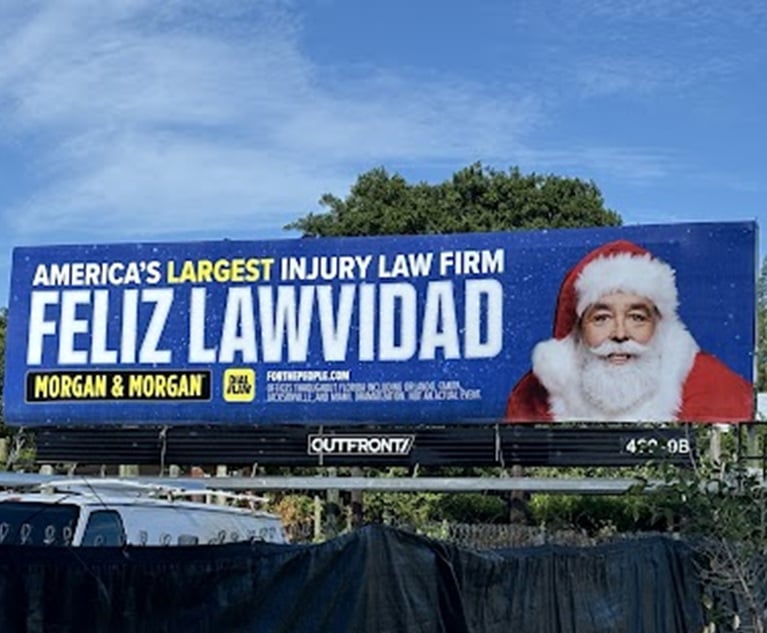 Shutterstock.com
Shutterstock.comFlorida Lawyer's Client-Poaching Claims Rightly Dismissed, Appeals Court Says
The attorney's lawsuit claimed he was bad mouthed by another attorney during a break in court proceedings.
August 27, 2019 at 08:02 AM
5 minute read
The original version of this story was published on New Jersey Law Journal
An appellate panel affirmed the dismissal of a Florida lawyer's claims that a New Jersey attorney poached his clients and defamed him.
The New Jersey Appellate Division ruling means plaintiff Ronald W. Horowitz, a freight transportation lawyer, fails in his pro se suit against Richard Furman and his firm, Kennedys CMK.
"Ordinarily, summary judgment is inappropriate prior to the completion of discovery," the panel said. But "we conclude from our de novo review that plaintiff did not meet his burden" of laying out a claim of tortious interference with contractual relations.
Horowitz accused Furman of wrongdoing with a former client, GMG Transportation Inc., arguing he had a valid 15-year contract with GMG and the defendants intended to harm him by inducing GMG to violate that agreement.
Horowitz also alleged tortious interference with prospective economic advantage and defamation, alleging the defendants defamed him by stating he was incapable of properly and effectively representing GMG, and depicted him in a false light by suggesting he failed to properly represent GMG.
The suit named Kennedys CMK and Carroll McNulty Kull. The law firm was formed when global law firm Kennedys merged with Carroll McNulty Kull in 2017.
"The only other parties with knowledge of the alleged conversations — Furman, [John] Coviello, GMG's president and [Edmund] Giza, GMG's former president — denied in sworn affidavits that any of the conversations took place, and plaintiff failed to show that depositions or any other discovery of these same or any other individuals would elicit contradicting or additional information to support his claims," Appellate Division Judges Joseph Yannotti, Garry Rothstadt and Arnold Natali Jr. said in a per curiam ruling Aug. 26.
They affirmed Monmouth County Superior Court Judge Marc Lemieux, who dismissed the case based on failure to sufficiently plead the claims and summary judgment.
Horowitz, who had a solo practice in Middletown, New Jersey, before moving to Florida, could not be reached for comment by deadline.
The Palm Coast attorney has been a Florida Bar member since 1985. His discipline record includes a 2018 admonishment for minor misconduct in a case that ended with a conditional guilty plea. He sought a refund for a continuing legal education course due to technical issues and admitted contacting a seminar employee after being told the company had an attorney.
Kevin Haas of Clyde & Co. in Summit, New Jersey, represented Furman and the other defendants in the New Jersey case. Haas was not immediately available for comment.
Beginning in 2002, the appellate decision said Horowitz regularly represented GMG Transportation and GMG Transwest Corp., two New York freight transportation companies collectively known as GMG.
Horowitz was retained to recover $250,000 from a former customer, and he sued in the U.S. District Court for the Eastern District of New York, obtaining a $250,000 default judgment. The judgment was vacated, and the customer sued GMG in New York state court, claiming conversion of its freight.
Years passed, and in 2015, Horowitz urged GMG to hire Furman, a freight transportation lawyer then with Carroll McNulty Kull, to serve as local counsel in New York. Furman attended court and prepared documents, and both he and Horowitz participated in the 2016 trial.
Horowitz's suit alleged Furman bad mouthed him to GMG executives during an adjournment in the proceedings, urging them to fire Horowitz. GMG did so in July 2016. Horowitz later claimed in removing him that GMG officials told him their decision was based on Furman's statement of Horowitz's handling of the New York case. Coviello asked Horowitz to forward all files and documents to Furman, and GMG never again gave work to Horowitz, according to the decision.
After Horowitz filed his suit, the defendants moved to dismiss in January 2018.
Horowitz opposed the motion, pointing to Nostrame v. Santiago, a 2013 ruling by the New Jersey Supreme Courtm which held, there are "only rare circumstances in which an attorney will behave in a manner that could translate into a claim by another attorney for tortious interference."
The court emphasized attorneys may not defame, defraud, intimidate, harass, make comparisons or misrepresent in an effort to win a client's business.
Horowitz also relied on the Rules of Professional Conduct in contending Furman's actions were improper.
Lemieux dismissed as time-barred Horowitz's defamation claim with prejudice but granted him leave to amend his complaint on the remaining two claims, according to the decision. Horowitz filed a second amended complaint in 2018.
"Notably, the complaint was silent as to the source of any of Horowitz's allegations about what Furman allegedly told GMG's representatives about him," the Appellate Division said.
The defendants again moved to dismiss or alternatively for summary judgment. Certifications from Coviello and Giza denied being advised by Furman to dump Horowitz as counsel.
Lemieux granted dismissal, holding in part that the suit relied on insufficient "personal assertions." The judge rejected claims that Horowitz should've been allowed to depose the defendants to gather additional facts and said Horowitz failed to give examples of the defendants' allegedly misleading statements.
The panel found the complaint "was properly dismissed with prejudice," noting Horowitz "did not allege that the disparaging statements were made to him or in his presence, nor did he divulge how they were otherwise made known to him."
This content has been archived. It is available through our partners, LexisNexis® and Bloomberg Law.
To view this content, please continue to their sites.
Not a Lexis Subscriber?
Subscribe Now
Not a Bloomberg Law Subscriber?
Subscribe Now
NOT FOR REPRINT
© 2024 ALM Global, LLC, All Rights Reserved. Request academic re-use from www.copyright.com. All other uses, submit a request to [email protected]. For more information visit Asset & Logo Licensing.
You Might Like
View All
Florida-Based Law Firms Start to Lag, As New York Takes a Bigger Piece of Deals
3 minute read

Morgan & Morgan Looks to Grow Into Complex Litigation While Still Keeping its Billboards Up
6 minute read
Lost in the Legal Maze: How State Regulations Are Hindering Hemp Operators' Success
7 minute readTrending Stories
- 1Gibson Dunn Sued By Crypto Client After Lateral Hire Causes Conflict of Interest
- 2Trump's Solicitor General Expected to 'Flip' Prelogar's Positions at Supreme Court
- 3Pharmacy Lawyers See Promise in NY Regulator's Curbs on PBM Industry
- 4Outgoing USPTO Director Kathi Vidal: ‘We All Want the Country to Be in a Better Place’
- 5Supreme Court Will Review Constitutionality Of FCC's Universal Service Fund
Who Got The Work
Michael G. Bongiorno, Andrew Scott Dulberg and Elizabeth E. Driscoll from Wilmer Cutler Pickering Hale and Dorr have stepped in to represent Symbotic Inc., an A.I.-enabled technology platform that focuses on increasing supply chain efficiency, and other defendants in a pending shareholder derivative lawsuit. The case, filed Oct. 2 in Massachusetts District Court by the Brown Law Firm on behalf of Stephen Austen, accuses certain officers and directors of misleading investors in regard to Symbotic's potential for margin growth by failing to disclose that the company was not equipped to timely deploy its systems or manage expenses through project delays. The case, assigned to U.S. District Judge Nathaniel M. Gorton, is 1:24-cv-12522, Austen v. Cohen et al.
Who Got The Work
Edmund Polubinski and Marie Killmond of Davis Polk & Wardwell have entered appearances for data platform software development company MongoDB and other defendants in a pending shareholder derivative lawsuit. The action, filed Oct. 7 in New York Southern District Court by the Brown Law Firm, accuses the company's directors and/or officers of falsely expressing confidence in the company’s restructuring of its sales incentive plan and downplaying the severity of decreases in its upfront commitments. The case is 1:24-cv-07594, Roy v. Ittycheria et al.
Who Got The Work
Amy O. Bruchs and Kurt F. Ellison of Michael Best & Friedrich have entered appearances for Epic Systems Corp. in a pending employment discrimination lawsuit. The suit was filed Sept. 7 in Wisconsin Western District Court by Levine Eisberner LLC and Siri & Glimstad on behalf of a project manager who claims that he was wrongfully terminated after applying for a religious exemption to the defendant's COVID-19 vaccine mandate. The case, assigned to U.S. Magistrate Judge Anita Marie Boor, is 3:24-cv-00630, Secker, Nathan v. Epic Systems Corporation.
Who Got The Work
David X. Sullivan, Thomas J. Finn and Gregory A. Hall from McCarter & English have entered appearances for Sunrun Installation Services in a pending civil rights lawsuit. The complaint was filed Sept. 4 in Connecticut District Court by attorney Robert M. Berke on behalf of former employee George Edward Steins, who was arrested and charged with employing an unregistered home improvement salesperson. The complaint alleges that had Sunrun informed the Connecticut Department of Consumer Protection that the plaintiff's employment had ended in 2017 and that he no longer held Sunrun's home improvement contractor license, he would not have been hit with charges, which were dismissed in May 2024. The case, assigned to U.S. District Judge Jeffrey A. Meyer, is 3:24-cv-01423, Steins v. Sunrun, Inc. et al.
Who Got The Work
Greenberg Traurig shareholder Joshua L. Raskin has entered an appearance for boohoo.com UK Ltd. in a pending patent infringement lawsuit. The suit, filed Sept. 3 in Texas Eastern District Court by Rozier Hardt McDonough on behalf of Alto Dynamics, asserts five patents related to an online shopping platform. The case, assigned to U.S. District Judge Rodney Gilstrap, is 2:24-cv-00719, Alto Dynamics, LLC v. boohoo.com UK Limited.
Featured Firms
Law Offices of Gary Martin Hays & Associates, P.C.
(470) 294-1674
Law Offices of Mark E. Salomone
(857) 444-6468
Smith & Hassler
(713) 739-1250






